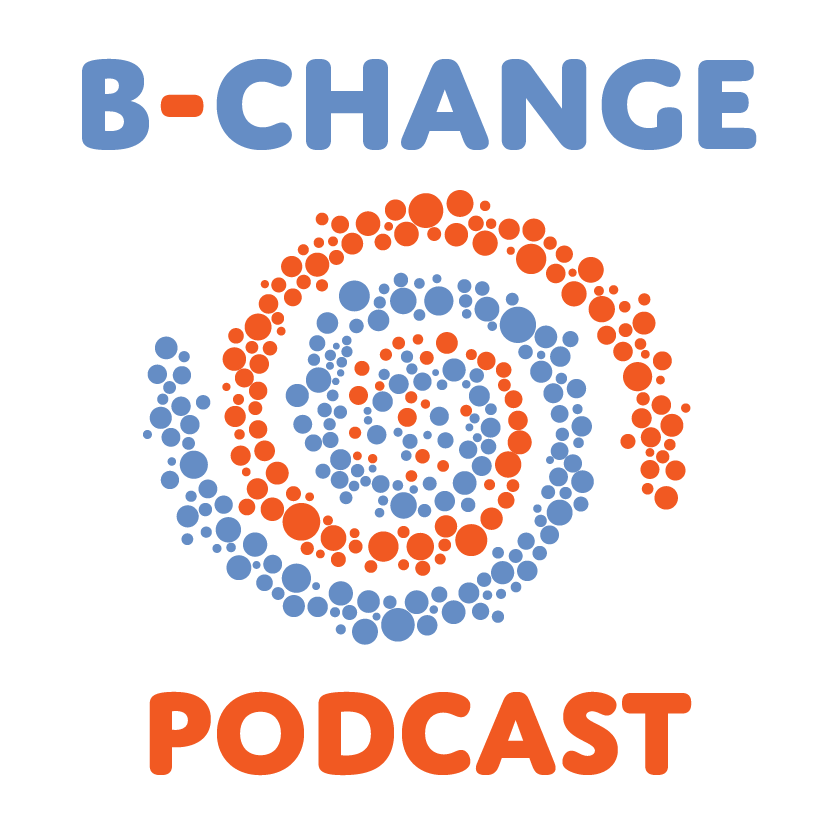Episodes
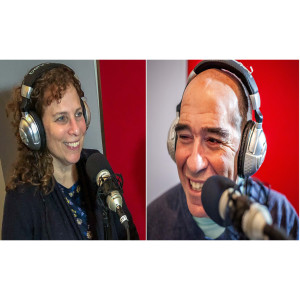
Sunday Jun 28, 2020
Sunday Jun 28, 2020
On June 16 Marcy and I zoomed down to Manhattan to participate in a dialogue about positive psychology and social justice, one of the central themes of the B-Change podcast. Our conversation highlights the very timely need to connect positive practices — such as focusing on strengths, practicing meditation, expressing gratitude — with systemic social change.
JCC Manhattan, through its online lunch and learn program, co-sponsored by the Wholebeing Institute, devoted a full week to discussions on this topic. We hope the energy remains strong to continue to connect positive psychology and social justice into the future and to take action as allies to communities of color.
In this episode, Marcy and I are interviewed by Caroline Kohles, Senior Director of Health & Wellness Programming at JCC. We would also like to express our gratitude to Phoebe Atkinson, who worked behind the scenes to make this episode possible.
We spoke with Caroline about:
- How social justice leaders can use the tools of positive psychology to be more effective and resilient during difficult times.
- How the leadership of social justice organizations can better reflects social justice values.
- What is the role of a white leader in a time of black and brown-led activism?
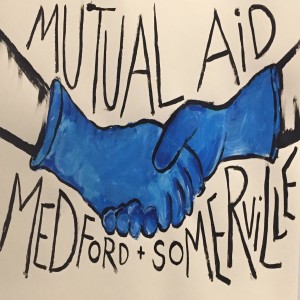
Sunday Jun 14, 2020
The Rise of MAMAS: Solidarity Not Charity
Sunday Jun 14, 2020
Sunday Jun 14, 2020
Jessie Norriss joined Mutual Aid of Medford and Somerville (MAMAS) on March 12, 2020, just as the coronavirus pandemic began and when the group was barely a week old. MAMAS, like other mutual aid societies that popped up around the country at that time, played an essential role in the collection and distribution of needed goods and services like food, rent, language interpretation, and transportation.
But there is more to this story. MAMAS’ slogan, like many other mutual aid societies around the country, is “Solidarity not charity.”
As Jessie says in this B-Change interview, “In charities, you're coming from a place of ‘I have something to offer to these poor disenfranchised communities over there but I'm not a part of them.’ We really try to break down that hierarchy.’”
Even as MAMAS has helped community members share needed resources during the crisis, they also sought to address systemic inequities that have become much more obvious during the pandemic. For example, with many languages spoken in the communities that MAMAS is working in, MAMAS has made language justice a priority, engaging residents proficient in languages other than English.
As Jessie told us, “We came forward first as neighbors supporting neighbors but there is an underlying political education and redistribution campaign that obviously we're not going to shy away from.”
We also talk with Jessie about:
- How the volunteers at MAMAS were able to quickly set up a structure that could respond to many needs of the communities that MAMAS worked with.
- The connection between her study of water quality at Tufts University’s Department of Urban and Environmental Planning and Policy and her organizing and technical support role at MAMAS.
- The story of the neighbor to neighbor snow shoveling brigade that MAMAS grew out of.
Resources mentioned in this episode:
Mutual aid Medford and Somerville (MAMAS)
MAMAS Replication Document: Mutual Aid: how to build a network in your neighborhood (https://docs.google.com/document/d/1ca-sz4DRNvUg8ezcrfd6awH-ahxBDJwnbdzxm4_qDVs/edit)
Tufts University Department of Urban and environmental policy and Planning (https://as.tufts.edu/uep/)
Wikipedia article and talk about the origins and meaning of mutual aid societies (https://en.wikipedia.org/wiki/Mutual_aid_(organization_theory)
Article: Solidarity Not Charity: Mutual Aid for Mobilization and Survival by Dean Spade (http://www.deanspade.net/wp-content/uploads/2020/03/Mutual-Aid-Article-Social-Text-Final.pdf)
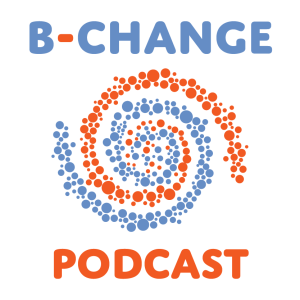
Sunday Apr 12, 2020
Sharing Leadership: A Conversation with Sheerine Alemzadeh (Re-release)
Sunday Apr 12, 2020
Sunday Apr 12, 2020
Is it healthy for an organization to have leadership centralized in one person — the executive director? Is leadership development “one size fits all”?
Sheerine Alemzadeh and Karla Altmayer turned the conventional model of nonprofit leadership on its head when they co-founded Healing to Action, a Chicago-based nonprofit that engages low wage workers in combatting sexual violence. In this episode, Alemzadeh takes our listeners into her organization’s journey, where they tackled:
- Broadening leadership from one central leader to a co-directorship model.
- Sharing power and leadership with their constituents — survivors of sexual violence.
- Finding new ways to tap these survivors’ unique strengths, recognizing that traditional organizing fails to account for their traumatic experiences.
Sheerine recommended two resources:
Emergent Strategy by Adrienne Maree Brown
https://www.akpress.org/emergentstrategy.html
Trauma Stewardship, Laura Lipsky
https://traumastewardship.com/laura-van-dernoot-lipsky/

Sunday Mar 29, 2020
Sunday Mar 29, 2020
When a hurricane or tropical storm hits Texas, Tomas Aguilar wants the immigrant residents he works with to be effectively organized to withstand the storms. The Living Hope Wheelchair Association where he works seeks to make sure that immigrants of limited means can be protected and that they have a voice in public policy that will improve the chances for their survival in the future.
In this episode, Tomas talks about:
- After the devastation of Hurricane Harvey, how his small organization visited the mobile homes and trailers where many of their constituents actually lived and found ways to better connect immigrants with the aid that was lacking after that hurricane.
- Tools and techniques that can help new leaders be more effective at using data to reduce the disproportionate impact of catastrophic events.
- His own story as a person who made a transition from working in fast food restaurants to working for social justice organizations.
Resources:
- Risk Amid Recovery: Occupational Health and Safety of Latino Day Laborers in the Aftermath of the Gulf Coast Hurricanes, Linda Delp, Laura Podolsky, and Tomás Aguilar
- Living Hope Wheelchair Association
- Tech Soup - tech for nonprofits
- Progressive Technology Project
- United for a Fair Economy
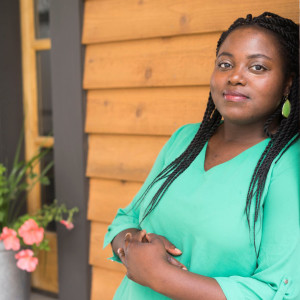
Sunday Mar 15, 2020
Community Planning From The Inside Out With Allentza Michel
Sunday Mar 15, 2020
Sunday Mar 15, 2020
Growing up in Mattapan, a neighborhood on the southern tip of Boston that today comprises predominantly people of color, Allentza Michel didn’t know that urban planning was even a potential field of study for her. Yet, she felt its impacts every day: a history of redlining, segregation, and, more recently, gentrification. But she also experienced the community’s rich tradition of “looking after each other”.
As she became familiar with the field of urban planning, it didn’t appear that there was a place for her as a Haitian-American woman, given that the vast majority of planners were white, male, and middle-class. Those planners looked and thought more like the elected officials who were hiring them and making critical decisions about the future of neighborhoods like hers.
Now Allentza has joined with a network of women of color who are taking planning processes and “flipping them on their head” in order to ensure that the people most impacted have a strong voice at the table. Allentza has a Masters in Public Policy from Tufts University's Urban and Environmental Planning and Policy program. In this episode, she describes:
- The need to disrupt traditional planning through approaches that put impacted residents at the center — such as community-engaged “civic hacks” which generate outside-the-box ideas in historically marginalized neighborhoods.
- Some key principles and practices that leaders can use to engage in democratic planning processes.
- Her experience launching a nonprofit organization that both fosters innovative, inclusive community planning processes and seeks to itself reflect those democratic and participative values.
Resources mentioned in this episode:
The Color of Law, Richard Rothstein
A People’s History of New Boston, Jim Vrabel
Go Boston 2030
Interaction Institute for Social Change
Powerful Pathways,
Mattapan Open Studios
Mel King Institute
Mass Smart Growth Alliance
Masters in Public Policy from Tufts University's Urban and Environmental Planning and Policy program
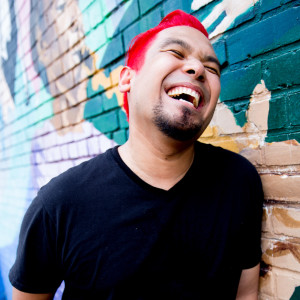
Sunday Mar 01, 2020
Can Joy Fuel The Revolution? Ask Marc Cordon.
Sunday Mar 01, 2020
Sunday Mar 01, 2020
In school growing up, Marc Cardon had been repeatedly bullied and mocked In school because teachers and students thought he looked “Native American.” So, it’s hardly surprising that when he first became engaged with social justice activism, he developed tactics rooted in anger and fear.
When Marc was first exposed to positive psychology, he was skeptical. He knew that fear and anger had been effective strategies for him and for social movements in general to accomplish their goals. But where could positive emotions like joy fit into the picture? And could these positive emotions help fuel a social movement and the individuals who make it up? He enrolled in the Certificate in Positive Psychology Program offered by the Whole Being Institute to investigate where positive psychology can overlap with social justice.
In this episode, Marc talks about:
- The challenge in finding the right balance between positive and negative emotions in social justice work.
- The value of positive emotions and rituals to building a sense of community, enabling individuals and movements to sustain themselves, especially when the work gets difficult.
- How The Joy Revolution, the organization he co-founded, “teaches change-agents, luminaries, and other do-gooders how to create positive social impact and lasting change through an expanded experience of joy.”
Resources:
Videos:
A Revolution of Joy / Marc Cordon / Speakers Who Dare NYC 2019. https://www.youtube.com/watch?v=sbmdJjfJFMI
How to Have Extraordinary Growth on Ordinary Days | Marc Cordon | TEDxFarmingdale. https://www.youtube.com/watch?v=nkn31_553L8&t=369s
Organizations:
The Joy Revolution. https://joyrevolution.com/
Books:
Beyond Resilient: The Coach's Guide to Ecstatic Growth. https://www.amazon.com/Beyond-Resilient-Coachs-Ecstatic-Growth-ebook/dp/B076JK4SBJ
Authors/theories mentioned in the episode:
Victor Frankl - Man’s Search for Meaning
Charles Snyder, Hope Theory
Carol Dweck, Mindset: The New Psychology of Success
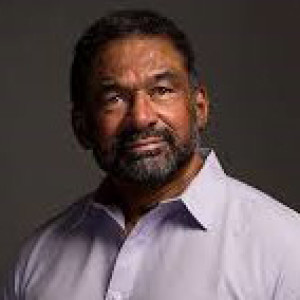
Sunday Feb 16, 2020
Just Sustainabilities: A Conversation with Julian Agyeman
Sunday Feb 16, 2020
Sunday Feb 16, 2020
How can we advance environmental sustainability so that equity, and the people most affected, are at the core — not an afterthought? That’s the key question that our guest, Julian Agyeman, explores on our most recent B-Change podcast episode.
He answered the question with multiple examples of what he calls “just sustainabilities”, an approach that he defines as “the need to ensure a better quality of life for all, now, and into the future, in a just and equitable manner, whilst living within the limits of supporting ecosystems.”
Julian Agyeman is a Professor of Urban and Environmental Policy and Planning at Tufts University. He is the author or editor of 12 books, many of them focused on just sustainabilities (see Julian Agyeman’s website at https://julianagyeman.com/)
The examples that Julian discusses in this episode include:
Embracing the idea of co-production, the concept that community members can work side-by-side with institutions to create better results when you use the strengths and knowledge of both.
Moving towards “community resilience.” Rather than focusing only on personal resilience, the ability to “bounce back” after adversity, Julian talks about how whole communities can be more resilient and the role that leaders can play in encouraging thinking that’s more systemic.
Putting front and center the voices of people most impacted by injustice, whose stories have long been ignored.
Resources:
Julian Agyeman website. Here is where you’ll find a comprehensive collection that includes Julian’s blog, books, publications, and videos of several presentations among other resources.
https://julianagyeman.com/
Julian Agyeman faculty profile on the Tufts University Urban and Environmental Policy and Planning website:
https://as.tufts.edu/uep/people/faculty/julian-agyeman
Social media:
Follow and engage with Julian Agyeman on Twitter:
@julianagyeman
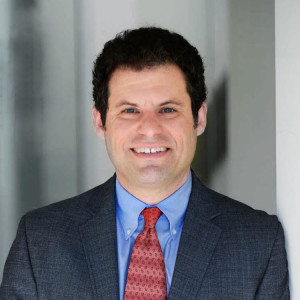
Sunday Feb 02, 2020
Tackling Disputes That Never Go Away: A Conversation With Eben Weitzman
Sunday Feb 02, 2020
Sunday Feb 02, 2020
When people think about conflict resolution, they often picture a mediator sitting down with a couple of people in an organization to resolve a dispute. Eben Weitzman does some of that, but his real interest lies in resolving deep-seated systemic conflicts in organizations — disputes that “never go away” or where there is a pattern of conflicts constantly arising about what seemed to be different issues but perhaps the conflicts are springing up because of an unidentified “root cause” that needs to be addressed.
Weitzman directs the conflict resolution program at UMass Boston's Department of Conflict Resolution, Human Security and Global Governance. He has worked with a wide range of groups -- from human rights, healthcare organizations, labor unions, and government -- tackling organizational conflict, cross-cultural conflict, and intergroup relations. In this episode, Eben discusses:
- Strategies and tools that can help leaders manage the emotional triggers that can sabotage their personal and organizational effectiveness.
- How to develop a diverse leadership team that understands that conflict does not need to be feared, but rather can be a source of growth for the organization.
- Creating an organizational design that lifts people out of their day to day turf battles, sets the direction, and sets criteria for organizational success.
Resources and links:
Department of Conflict Resolution, Human Security and Global Governance, University of Massachusetts Boston
Designing Your Organization. (2007) by Amy Kates and Jay R. Galbraith. Jossey-Bass Publishers, an Imprint of Wiley
The Star Model, Jay B Galbraith
The Cowboy Mentality: Organizers and Occupational Commitment in the New Labor Movement, Daisy Rooks
Tracking, developed by Delyte Frost
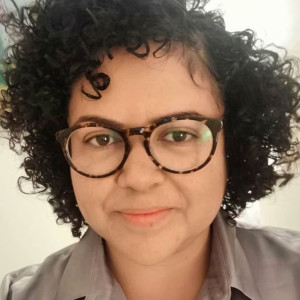
Sunday Jan 12, 2020
Sunday Jan 12, 2020
What does it mean to have four generations in the same workplace -- from babyboomers to Gen Z? What happens when they engage in big cultural issues such as Me Too, racial justice and gender expression? That’s the very issue that certified professional coach Ana Polanco tackles, as she helps social justice organizations bridge the generation divide and promote shared values. In her career, Polanco has worked with organizations such as Amnesty International, the hospitality union UNITE HERE, and the AFL-CIO’s Labor Council for Latin American Advancement.
In this episode, Polanco discusses:
- Confronting difficult conversations among multiple generations of workers on potentially thorny issues of race, culture and sexual orientation in the workplace and in the larger society.
- How these different generations of workers in social justice organizations think, talk and act about social justice issues and how that can contribute to disagreements and miscommunication within the organization’s mission.
- Techniques to bridge these differences and promote communication that allows workers to foster a new, collaborative relationship.
Resources include:
Emergent coaching becomes nimble in complex times, Ana Polanco, Nonprofit Quarterly, 2019
The Paradox of diversity in social change organizations, Heather Berthoud and Bob Greene, 2014
Anapolanco.org
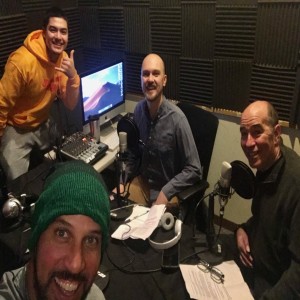
Sunday Dec 22, 2019
Sunday Dec 22, 2019
The infectious beat of Marcus Santos and the Brazilian drumming group he leads helps students at Somerville high school feel more welcome and engage in the community. Marcus has spearheaded the formation of a loose network of more than 20 drumming groups around the world. The Somerville group and the network as a whole are called Grooversity. In this episode, Marcus is joined by Elmer Pleitez, a junior at Somerville High School. Marcus and Elmer talk about:
- Why this style of street music was banned in Brazil along with related Afro-Brazilian styles such as Samba reggae and how the US civil rights movement influenced these musical forms.
- How making a better match between the mostly immigrant population at a high school and the music that is practiced and performed has contributed to a better sense of comfort and engagement among all students.
- The Grooversity curriculum and its current focus on mental wellness.
- Marcus and Elmer’s advice to social justice leaders who want to diversify the membership within the group: help promote the pursuit of happiness and create a loving structure for participants.
Our producer, John Consilvio joins Warren Goldstein-Gelb behind the microphone for this interview.
Resources:
- Grooversity webpage including training videos:
- TED talks featuring Marcus and his students:
Grooversity Mission TedX
Marcos Santos at TedX Somerville
- Some of the music in this podcast episode is from the Grooversity CD.
- Social media:
Facebook
Twitter

